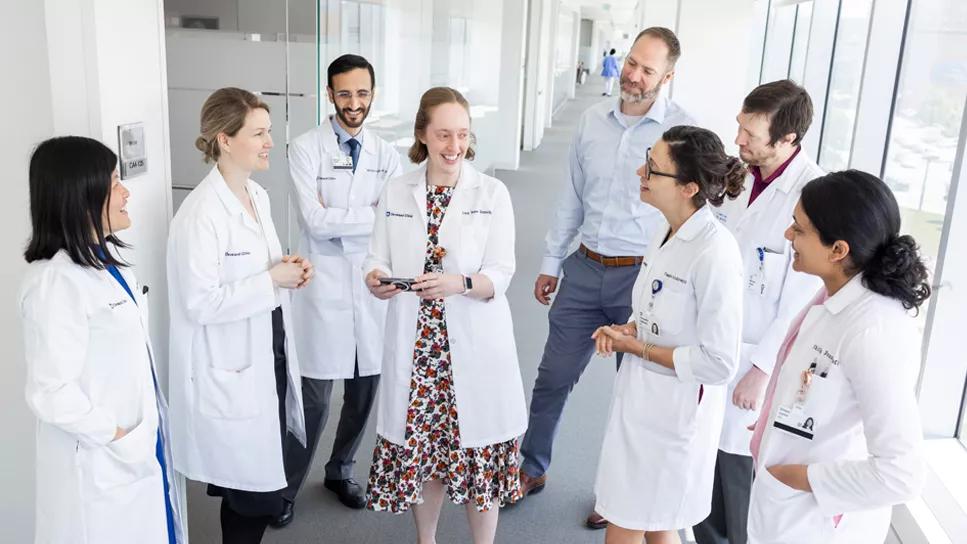First-of-its-kind clinic for immune-related adverse events supports oncologists in managing severe side effects

Image content: This image is available to view online.
View image online (https://assets.clevelandclinic.org/transform/3323230e-4875-4e6c-b60a-e6a66b1d4a19/oncology-pharmacovigilance-clinic-expands-group-photo)
Director of the Novel Cancer Therapeutics Center
From left to right - Dr. Keren Zhou (Endocrinology), Dr. Amy Kunchok (Neurology), Dr. Mamoun Abdoh (Pulmonary Medicine), Dr. Lucy Kennedy (Medical Oncology), Dr. Simon Mucha (Critical Care Medicine), Dr. Cassandra Calabrese (Rheumatology), Dr. Michael Smith (Pulmonary Medicine), and Dr. Shilpa Junna (Hepatology)
Advertisement
Cleveland Clinic is a non-profit academic medical center. Advertising on our site helps support our mission. We do not endorse non-Cleveland Clinic products or services. Policy
Immunotherapy has changed the face of cancer treatment, yet it is not without its shortcomings. Its mechanism of action — to stimulate immune system response —often results in serious adverse events. Immune checkpoint inhibitors, for example, can cause overstimulation of the body's immune system, resulting in dermatitis, colitis, hepatitis, endocrinopathy, pneumonitis or myocarditis. The unique profile of adverse events from checkpoint inhibitors can impact virtually any organ, compromising patients' treatment and recovery.
For those treating patients with refractory immune-related adverse events (irAE) or toxicities, there may also be uncertainty about the origins of a side effect. This brings immense complexity in caring for oncology patients.
Since 2017, Cleveland Clinic has addressed these cases through an irAE tumor board. Augmenting this work, the center created an Oncology Pharmacovigilance Clinic in 2023. The unique center brought together specialists from medical oncology, rheumatology, endocrinology, pulmonology, hepatology, neurology and dermatology to offer prompt evaluations and support from relevant specialists. This multidisciplinary approach is necessary for ensuring prompt diagnosis, expediting care and helping to streamline communication with the patient and their care team.
Based on a high need for this type of care, the center is bringing in additional specialists across gastroenterology, dermatology and nephrology. The team is focused on pinpointing the source of adverse events and helping improve patients' quality of life. These efforts can help facilitate making a diagnosis, starting treatment to help manage toxicity and helping patients get back on their cancer treatment.
Advertisement
One patient was referred to the clinic due to worsening arthralgias after receiving a combination of chemotherapy and immunotherapy. After the patient’s initial visit to the clinic, he was prescribed prednisone, and referred to a rheumatology specialist within the clinic, who initiated tocilizumab. When the patient was seen by rheumatology for follow-up later in the year, he reported that his joint pain had subsided and he experienced significant functional improvement.
Another patient was seen in the clinic after experiencing rapidly worsening pulmonary infiltrates after receiving neoadjuvant immunotherapy for melanoma. The pharmacovigilance clinic team was able to refer the patient expediently to pulmonology to help with management. The patient was prescribed steroids and the symptoms resolved.
Physicians within and outside of Cleveland Clinic can refer a patient for this consult service. Patients based in Ohio may be seen virtually or in-person, while those located outside the state will need to be seen in-person for their first visit and may choose telehealth or in-person visits after that. The Oncology Pharmacovigilance Clinic team will then communicate a recommended care plan back to the referring physician. They may also follow the patient longitudinally as part of future irAE research.
Learn more in our podcast with Drs. Ma and Kennedy.
Advertisement
Advertisement
Key themes and insights into the family-caregiver experience
A preview for radiation oncologists
Early communication between oncologists and ophthalmologist warranted
Variables affect nuances of the conversation
Driving advances in cancer care
Challenges emerge with application of interim PET scans
Complex, bidirectional interactions exist between cancer, therapy, toxicities and eating behaviors
Helping patients with cancer struggling with depression, anxiety and other mental health issues